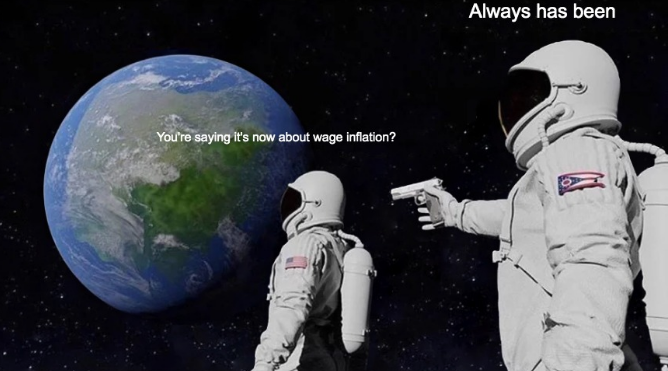Economics
Call it “wages”
David Beckworth directed me to a tweet by Jeanna Smialek:
A friendly shorthand for non-housing core services PCE? How about “wages”?
When nominal…

David Beckworth directed me to a tweet by Jeanna Smialek:

A friendly shorthand for non-housing core services PCE? How about “wages”?
When nominal wages grow at about 3%/year, inflation will average 2% in the long run. In that case, any deviations in the headline inflation rate will be transitory. The burst in inflation that began in 2021 went from being transitory to permanent when it became embedded in wage inflation.
If you listen closely to Jay Powell, it’s pretty clear that he understands that fact. But the Fed is reluctant to say this out loud. It sounds bad to emphasize that the number one goal of the Fed right now is to reduce wage increases. When the public hears that, they think in terms of real wages. Actually, a tight money policy that slows the growth of nominal wages will tend to cause real wages to rise in the short run. Some of the largest increases in real hourly wages occurred in years like 1921 and 1930, when nominal wage growth slowed due to tight money, but consumer prices fell much more dramatically.
Goods inflation is already slowing. Housing prices (part of services) are still rising due to the lagged effects of rent contracts signed earlier in 2022. But the inflation rate of “spot” rents on new rental contracts has begun slowing, and overall average level of rents will eventually follow suit. Today, the main outstanding problem is fast rising nominal wages, which is the primary factor behind non-housing service prices. But then nominal wage inflation has always been the essential monetary policy problem, as price inflation is a misleading guide to policy that mixes supply and demand side influences.
In other words:

(0 COMMENTS)
inflation
monetary
policy
fed
monetary policy

Argentina Is One of the Most Regulated Countries in the World
In the coming days and weeks, we can expect further, far‐reaching reform proposals that will go through the Argentine congress.
Crypto, Crude, & Crap Stocks Rally As Yield Curve Steepens, Rate-Cut Hopes Soar
Crypto, Crude, & Crap Stocks Rally As Yield Curve Steepens, Rate-Cut Hopes Soar
A weird week of macro data – strong jobless claims but…
Fed Pivot: A Blend of Confidence and Folly
Fed Pivot: Charting a New Course in Economic Strategy Dec 22, 2023 Introduction In the dynamic world of economics, the Federal Reserve, the central bank…



















